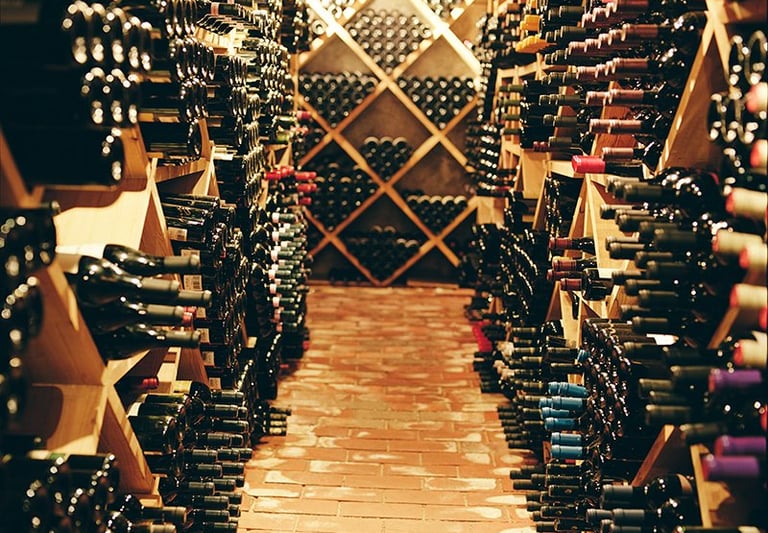
Subscribe to our newsletter
The Evolution of Private Wine Collections
Strategies for the Modern Collector
9/12/20243 min read


Introduction
Welcome back to WineLux, where we continue to explore the captivating world of luxury wines. This week, we delve into the evolution of private wine collections. For the modern collector, building and managing a wine collection is both an art and a science. Discover how today's collectors are curating their selections, maximising value, and ensuring their collections stand the test of time.
The Modern Wine Collector’s Approach
The approach to wine collecting has evolved significantly over the years. Modern collectors employ a combination of passion, strategy, and technology to curate exceptional collections.
1. Purposeful Curation
Focused Themes: Modern collectors often focus on specific themes, such as regions, varietals, or vintages, creating cohesive and meaningful collections.
Personal Taste: While investment potential is important, personal taste and enjoyment remain central to the curation process.
2. Utilising Technology
Digital Catalogues: Advanced software and apps help collectors manage their inventories, track provenance, and monitor market values.
Online Marketplaces: Platforms like Liv-ex and Wine-Searcher provide access to a global market, making it easier to buy and sell rare wines.
3. Expert Guidance
Consulting Experts: Many collectors work with wine consultants or sommeliers to make informed purchasing decisions and uncover hidden gems.
Wine Clubs and Societies: Joining exclusive wine clubs or societies offers access to limited releases and networking opportunities with other enthusiasts.
Building a Resilient Collection
A well-rounded and resilient wine collection requires careful planning and strategic investment. Here are key strategies for modern collectors:
1. Diversification
Regional Diversity: Investing in wines from various regions mitigates risk and enhances the overall appeal of the collection.
Varietal Variety: Including a range of grape varietals ensures a broad palate and reduces exposure to market fluctuations affecting specific wines.
2. Focus on Quality and Provenance
Top Producers: Prioritise wines from renowned producers known for their consistent quality and market performance.
Provenance Documentation: Maintain thorough records of each wine's history, including purchase details and storage conditions, to ensure authenticity and value.
3. Investment-Grade Wines
Blue-Chip Wines: Incorporate blue-chip wines, such as Bordeaux first growths and top Burgundy estates, which have a proven track record of appreciation.
Emerging Markets: Explore wines from emerging regions and up-and-coming producers that show potential for significant value growth.
Storage Solutions for Private Collections
Proper storage is essential to preserving the quality and value of a wine collection. Modern collectors invest in state-of-the-art storage solutions to protect their assets.
1. Home Cellars
Custom-Built Cellars: High-end custom-built cellars provide optimal storage conditions and showcase the collection elegantly.
Climate Control: Ensure the cellar is equipped with precise temperature and humidity control systems to maintain ideal conditions.
2. Professional Storage Facilities
Wine Storage Services: Professional storage facilities offer secure, climate-controlled environments for collectors who lack space or prefer off-site storage.
Insurance: Comprehensive insurance coverage for stored wines protects against theft, damage, and environmental hazards.
Valuing and Insuring Your Collection
Regular valuation and appropriate insurance are crucial for protecting and maximising the investment potential of a wine collection.
1. Professional Appraisals
Periodic Valuations: Schedule regular appraisals with professional wine valuers to keep track of your collection’s current market value.
Market Trends: Stay informed about market trends and price movements to make strategic buying and selling decisions.
2. Comprehensive Insurance
Coverage Options: Invest in insurance policies specifically designed for wine collections, covering risks such as breakage, theft, and natural disasters.
Documentation: Maintain detailed records and photographs of each bottle to facilitate the claims process if needed.
Case Studies: Iconic Private Collections
1. The Jefferson Collection
Overview: The wine collection of Thomas Jefferson, the third President of the United States, is legendary for its historical significance and exceptional quality.
Impact: Jefferson’s meticulous record-keeping and selection of fine Bordeaux and Burgundy wines set a benchmark for private collectors.
2. The Hardy Rodenstock Collection
Overview: German collector Hardy Rodenstock was known for his extensive and rare wine collection, including some of the oldest and most valuable bottles in existence.
Impact: Rodenstock’s collection brought attention to the importance of provenance and authenticity in wine collecting.
Conclusion
Building and maintaining a private wine collection is a rewarding endeavour that combines passion, strategy, and expertise. By employing modern techniques and leveraging technology, today’s collectors can curate exceptional collections that offer both enjoyment and investment potential.
Ready to elevate your wine collection to new heights? Subscribe to our WineLux newsletter for exclusive insights, expert advice, and the latest trends in luxury wine collecting. Join our community of discerning collectors and investors today!
